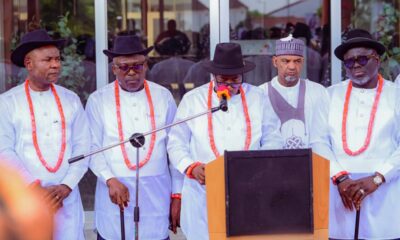News
Bye-Election: 12 Candidates Jostle For Gbajabiamila’s Seat In Surulere
The Independent National Electoral Commission (INEC) in Lagos State, says 12 candidates of different political parties will be contesting the February 3 Surulere Federal Constituency I bye-election.
The Lagos State INEC Resident Electoral Commissioner (REC) Prof. Ayobami Salami, disclosed this yesterday at a Stakeholders’ meeting with the leadership of political parties, religion, and security among other stakeholders.
The Tide’s source recalls that the Surulere Federal Constituency I seat became vacant due to the resignation of the former occupant, Rep. Femi Gbajabiamila, who after winning, was appointed by President Bola Tinubu as his Chief of Staff.
The REC said the purpose of the meeting was to brief party leaders on the commission’s level of preparedness for the forthcoming bye-election, scheduled for February 3.
“The commission is required by law to conduct a bye-election in Surulere federal constituency 1 to fill the vacancy arising from resignation of Gbajabiamila.
“It is worthy of note to inform us that this category of election belongs to the class of bye-elections, which are also fresh elections.
“To this end, it goes without saying that political parties must conduct fresh primaries within the time frame provided by the enabling instruments to elect their candidates.
“In tandem with the provisions of the enabling instruments, the following electoral activities have been undertaken so far, to ensure not only the smooth conduct of the process but also demonstrate its fairness and transparency.
“Notice of election was given on January 4, while party primaries to elect candidates held from Jan. 5 to Jan. 9.
“List of 14 political parties were forwarded from the national headquarters to partake in the process but only 12 political parties eventually participated and have been submitted to the national headquarters for publication,” Salami said.
He listed the candidates to include: Akinyemi Da-Sliva (Accord) Kayode Jelili (Action Alliance) Collins Aigbokhaode (African Democratic Congress) Fuad Laguda (All Progressives Congress) Jonathan Ololade (All Progressives Grand Alliance) and Samuel Ekwuruke (Allied People’s Movement).
Others are: Yinusa Adisa (Action People’s Party) Adeola Adebanjo (Labour Party) Jerry Afemighie (Peoples Democratic Party) Muyiwa Adedeji (Social Democratic Party); Oluwole Austine Brito (Young Progressive Party) Emereole Anthony (Zenith Labour Party).
According to him, recruitment and training of ad hoc officials to take part in the bye-election are on-going through root training.
“These ad hoc staff consist of serving corps members and INEC officials.
“The non-sensitive materials meant for the election have been arranged, while we await the delivery of sensitive materials,” the INEC boss said.
He said the essence of the meeting was also to keep all stakeholders on equal page in tandem with the mission statement of the commission which was to serve as an independent and effective Election Management Body (EMB).
Salami said that INEC was committed to the conduct of free, fair and credible elections for sustainable democracy.
“I want to assure all stakeholders that on our part, we are going to adhere strictly to our guiding principles and bring to bear, our core values with a view to ensuring that we midwife a process, devoid of any rancour or acrimony.
“Being a double edged game, the commission will also profoundly appreciate that the stakeholders play the game according to the established rules. The idea of ballot snatching, vote buying and thuggery should be jettisoned.
“Let us strive together to allow our democracy grow and stand the test of time, “ the INEC boss said.
Also speaking, the INEC Administrative Secretary, Mrs Feyijimi Saseyi, who recognised past efforts of the critical stakeholders, called for more cooperation and collaboration saying: “INEC work with rules and regulations.”
Saseyi advised party stakeholders to always approach INEC for any clarification when in doubt or confused.
Addressing the stakeholders on level of preparedness, Mr Gabriel Abidakun, INEC Head of Department (HOD) Election Party Monitoring said that primary elections, if properly carried out by political parties, was to deepen internal democracy within the party.
Abidakun, who noted that the next phase of the exercise was campaign, said that public campaigns by political parties would commence on Jan. 18 and end on Feb. 1.
“Take violence out of the campaign. Eschew violence. The space is wide enough for all political parties to campaign. Do your campaign without violence.
“Take permission from constituted authority before open air rallies and processions. Adhere to the spending limits and date for the submission of the party agents.
“Avoid foul language, sell your candidate and leave them alone to make their choice,” Abidakun said.
Also speaking, Mrs Oluyemi Adeyemi -Showunmi, the HOD, Electoral Operations, said that Surulere Federal Constituency I consisted of six Registration Areas (Wards) and 258 Polling Units.
According to her, the total number of registered voters in the six wards remained the same at 140,377, while only 121, 111 Permanent Voter Cards (PVCs) were collected.
Adeyemi-Showunmi said the commission had begun batching non sensitive materials which would soon be distributed.
Also, Mr Muyiwa Yusuf, the INEC HOD ICT explained that no fewer than 258 Bimodal Accreditation Voter Machine (BVAS) aside back up BVAS, would be deployed, adding that the configuration of the machine would soon start.
The Tide source reports that other INEC HODs also took turns to explain to the stakeholders, their level of preparations for the election.
News
Fubara Attends PDPGF Meeting In Asaba …..Back Court Verdict On National Secretary Position

Rivers State Governor, Sir Siminalayi Fubara, last Friday, attended the Peoples Democratic Party Governors’ Forum (PDP-GF) meeting in Asaba, the Delta State capital.
The Rivers State Governor, who is the Vice Chairman of the PDP Governors’ Forum, attended the meeting, alongside 10 other Governors of the party’s controlled states across the six geopolitical zones of the country.
The first PDPGF meeting in 2025, was held at the Government House in Asaba, at the end of which a seven-point resolution was reached.
Reading the communique at the end of the meeting, the Chairman of the Forum, and Governor of Bauchi State, Senator Bala Mohammed urged the National Working Committee (NWC) to put every machinery in place to ensure a hitch-free NEC meeting on March 13, 2025.
The communique stated:
“The Forum, having examined all the notices required by law to be given to validly convoke NEC, advised NWC to reschedule NEC to the thirteenth (13Th) of March 2025.”
The Forum further noted the Court of Appeal judgment affirming Udeh Okoye as the National Secretary of the party, saying that as a party that believes in the rule of law, it will respect the position of the Appellate Court on the matter.
“The Forum noted with delight the ongoing efforts at resolving the crisis in the National Working Committee, NWC, on the position of the National Secretary, and has reaffirmed its support for the Court of Appeal judgment; consequently, the Forum advised the NWC to set up the machinery for the effective implementation of the court judgment.
“While commending the country’s valiant and patriotic Armed Forces and Security Agencies for maintaining the frontline in securing the country and the gains of our gallant personnel against bandits in parts of the country, the Forum viewed with deep concern, the resurgence of brazen non-state actors. It, therefore, calls for the strengthening of the nation’s security architecture.”
Governors in attendance include: H.E Senator Bala Abdulkadir Mohammed (Bauchi State); H.E Sir Siminalayi Fubara (Rivers State) – Vice Chairman; H.E Rt. Hon. Sheriff Oborevwori (Delta State) – Host; H.E Dr. Agbu Kefas (Taraba State); H.E Rt. Hon. Ahmadu Umaru Fintiri (Adamawa State); and H.E Dr. Dauda Lawal (Zamfara State).
Others are H.E Senator Ademola Adeleke (Osun State); H.E Senator Douye Diri (Bayelsa State); H.E Pastor Umo Eno Ph.D (Akwa Ibom State); H.E Dr. Peter Mbah (Enugu State); H.E Barr. Caleb Mutfwang (Plateau State);
and H.E Bayo Lawal (Deputy Governor, Oyo State), who represented Governor Seyi Makinde.
News
NGO Implants Free Pacemakers Into 22 Cardiac Patients In PH
A United States based Non Governmental Organisation, Cardiovascular Education Forum, in collaboration with the University of Port Harcourt Teaching Hospital (UPTH), has successfully implanted free pacemakers into 22 patients with different cardiac cases in Port Harcourt.
This is in a bid to save lives and encourage patients with low heartbeats to live longer.
The implantable device, which costs $20,000 each, was inserted free of charge on the selected patients.
Speaking during a Special Hospital Ground Rounds at the UPTH with its Theme, “Recent Advances in Cardiac Pacing,” a cardiac Physiologist, Dr Neil Grub, said the NGO was in Nigeria to improve training and learning on cardiac issues and help patients with cardiac problems.
Accompanied by a team of experts comprising a cardiologist and cardiac device implanter, Dr Jagdeep Siagh, and UPTH interventional cardiologist, Dr Edafe Emmanuel, Dr Grubb said pacemakers were inserted on patients with low heartbeats to boost their heart rates.
Earlier, the Chief Medical Director, UPTH, Prof Henry Arinze Ugboma, said each of the implantable devices cost over $20,000.
Ugboma, represented by the Chairman, Medical Advisory Committee, UPTH, Prof Datonye Alasia, said the partnership between UPTH and the foreign NGO was to build networks, and improve services in terms of healthcare delivery, training and learning.
According to him, there is now a ray of hope in terms of treatment of patients with cardiovascular cases in the hospital.
He said the UPTH started the collaboration with Cardiovascular Education Forum in 2018 to boost health, training and learning on cardiac health.
He assured that, “in coming years, the scale of our collaboration with the mission will be higher.”
Chinedu Wosu
News
FG Unveils National Broadband Alliance To Drive Internet Access
The Federal Government has unveiled the National Broadband Alliance, a new initiative aimed at transforming the nation’s digital infrastructure and boosting connectivity across the country.
The initiative was unveiled yesterday in Lagos by the Minister of Communications, Innovation, and Digital Economy, Bosun Tijani, who was represented by the Executive Vice Chairman of the Nigerian Communications Commission, Aminu Maida.
In his address, Tijani stated that NBAN would significantly enhance broadband penetration, which has grown from just six per cent in 2015 to approximately 42 per cent as of October 2024.
To support this agenda, he said the government was leveraging a Special Purpose Vehicle to deploy 90,000 km of fibre backbone across the nation, connecting underserved and rural communities to high-speed internet.
According to him, the initiative aligns with the Renewed Hope Agenda of President Bola Ahmed Tinubu, which prioritises innovation, technology, and collaboration as key drivers of national prosperity.
Tijani stated that the expansion would not only improve access to reliable broadband but also empower Nigerians, particularly in rural areas.
“While the progress made in broadband penetration is commendable, we recognise that much more needs to be done to ensure every Nigerian can enjoy the benefits of reliable, high-speed internet,” Tijani said.
The minister also emphasised the importance of strategic partnerships with donors, investors, and other key stakeholders in achieving the goals set out in the National Broadband Plan (2020–2025).
He said these collaborations would be essential in overcoming infrastructure development challenges and making broadband affordable and accessible for all Nigerians.
“These targets reflect our unwavering commitment to ensuring that broadband is accessible, affordable, and inclusive for all Nigerians. However, we are also aware of the challenges ahead,” he added.
Tijani stressed that achieving the government’s targets—70 per cent broadband penetration by 2025, a minimum internet speed of 25 Mbps in urban areas, and broadband access for 80 per cent of the population by 2027—will require sustained efforts.
“Achieving these goals will require more than just the efforts of the private sector. It will require a holistic approach that includes strategic partnerships with donors, investors, and other key stakeholders in accelerating the rollout of critical infrastructure,” he said.
-
Rivers2 days ago
NOSDRA D-G Disburses N150m To 300 Farmers In Rivers
-

 Niger Delta2 days ago
Niger Delta2 days agoOgoni Postgraduate Forum Tasks HYPREP On Scholarship Scheme
-
Business2 days ago
NCDMB Assures Greater Local Industry Participation In Oil, Gas Projects
-

 News2 days ago
News2 days agoNigeria Strengthens Economic Ties With Germany To Boost Investment, Jobs
-

 Featured2 days ago
Featured2 days agoFubara Flags Off Upgrading Of 135 Primary Healthcare Facilities In Rivers
-
Rivers2 days ago
Bonny Protest Neglect, Seeks CSR MoU Implementation
-
Nation2 days ago
FG Begins Tolling On Abuja-Keffi-Akwanga-Makurdi Highway
-
Business2 days ago
NDYC Seeks NDDC Commercialisation … Uncompleted Projects Completion

